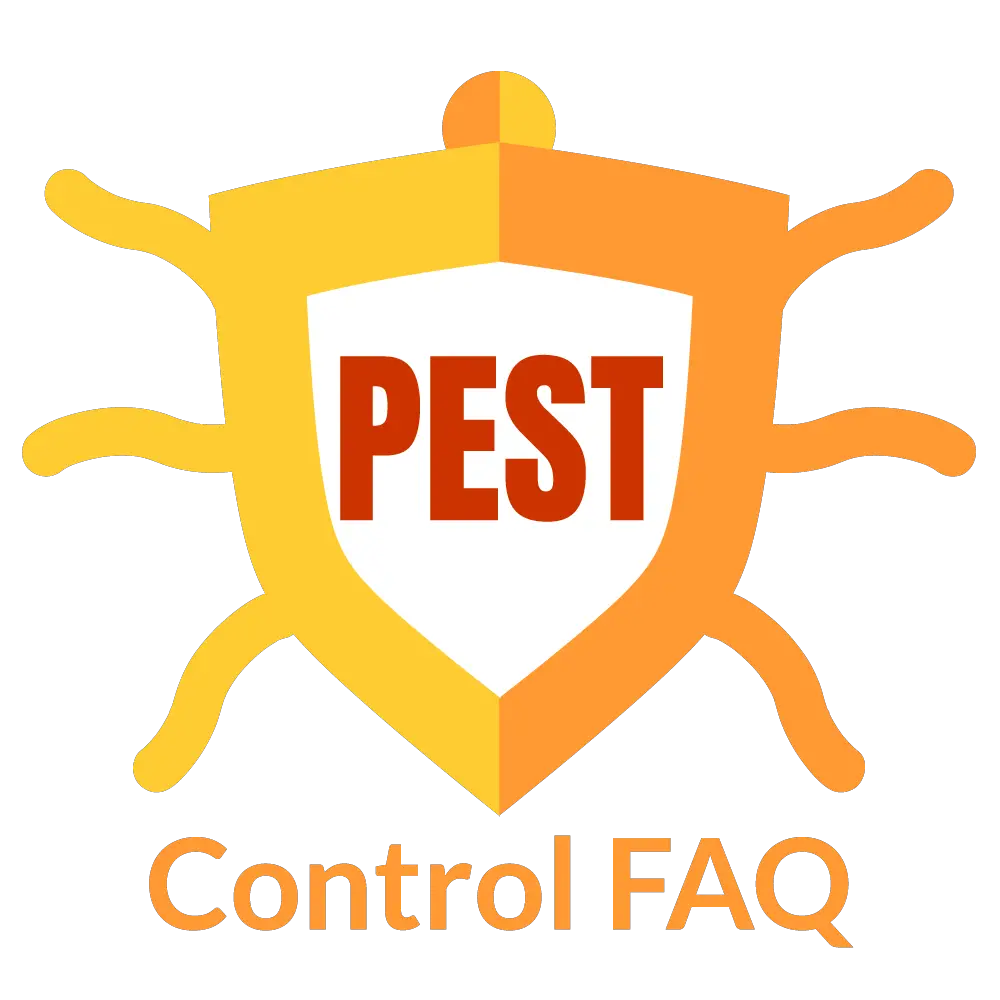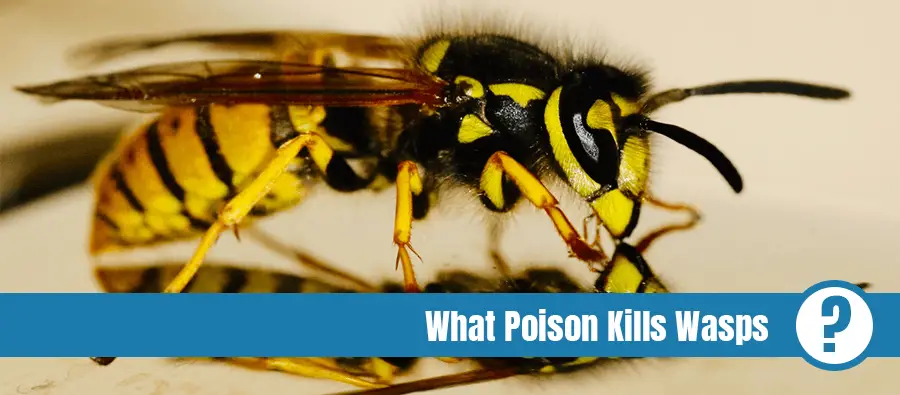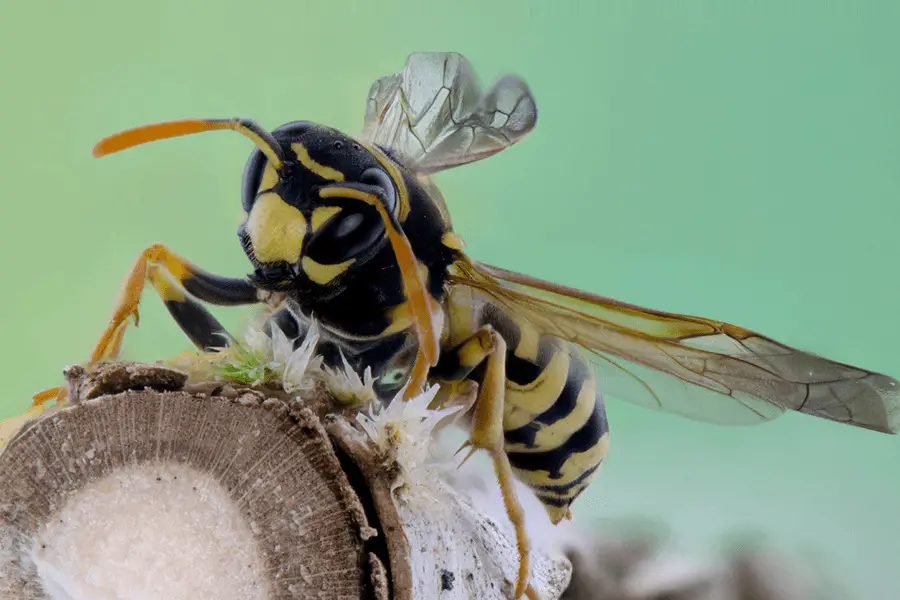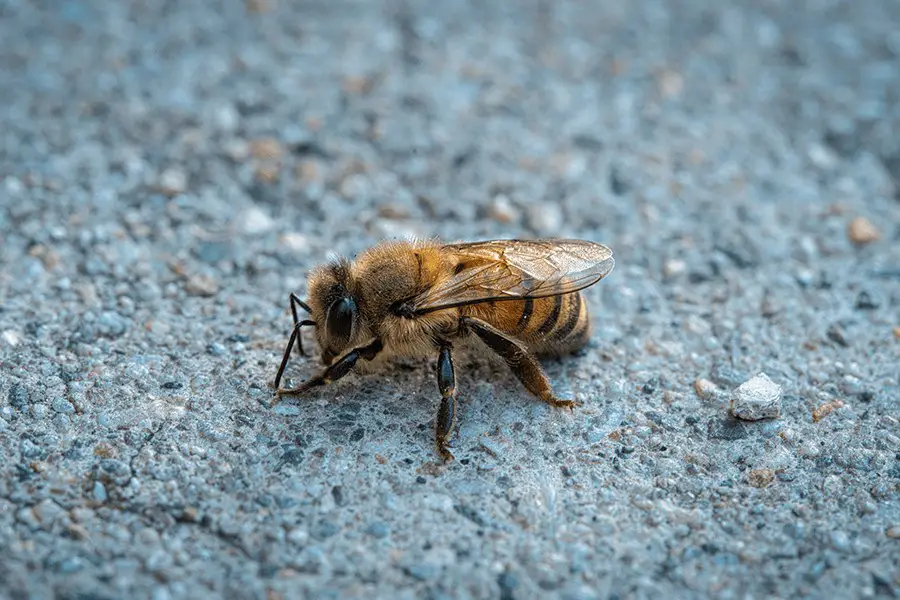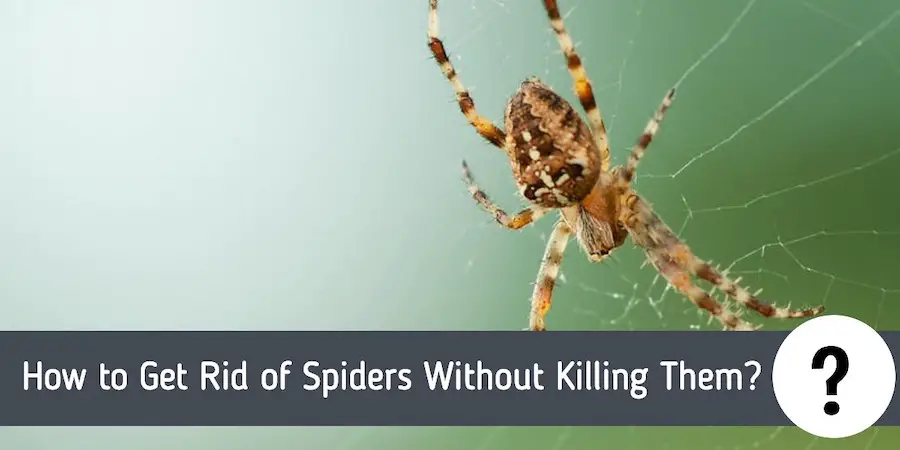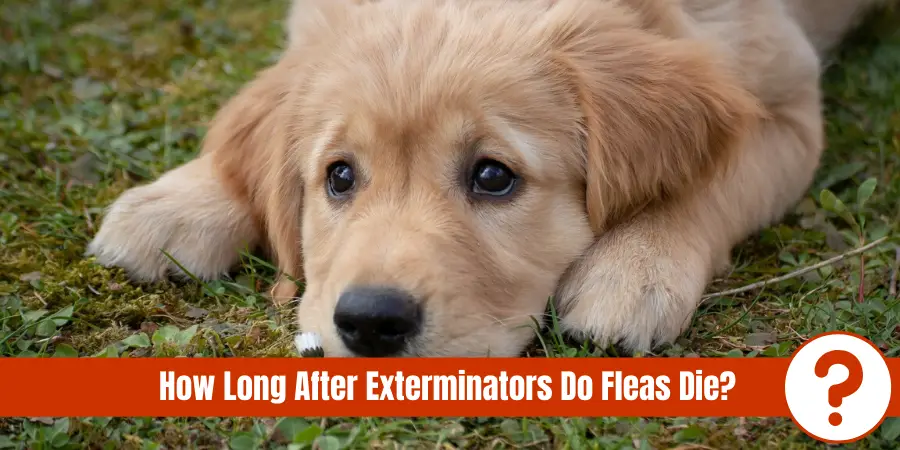There are several ways to deal with wasps, including sucking them up with a vacuum, using sprays, or even applying poisons. Although non-toxic solutions should be considered, poisons are very effective and fast-acting.
Which active ingredient, or poison, kills wasps the best? The answer is pyrethroids. It is the most commonly used wasp poison. This doesn’t mean that it is the only one, though. There are some other toxins you can use against wasps.
Below you’ll find more information regarding pesticides for the wasp control. You’ll also discover effective natural repellents you can use to protect your home and family.
Wasps vs bees – how to identify them
Every year in the warmer months, wasps migrate and extend across the United States. These are dangerous insects with venom in their stingers. But even more so, they build their nests around your property and can sting you unexpectedly if they are disturbed.
There are multiple types of wasps including paper wasps, hornets, and yellow jackets, which are the most prevalent and disturbing to homes and properties. While bees are generally peaceful insects, wasps are more aggressive and can sting more often without losing their stinger. Wasps feed on other insects, not plants.
Looking at a wasp next to a honeybee, you’ll notice the distinct waist of the wasp as well as the hair-free body. Bees are fuzzier which helps with pollination. The yellow color of the wasp’s stripes is also brighter than those from a bee.
Now you know how to identify a wasp and a bee. If you’ve noticed wasps flying around your home or their nests, you’ll need to start treating these pests immediately. How do you protect your home and your family? There are several options that include vacuums, sprays, non-chemical-based approaches, and poisons.
What poisons kill wasps?
The problem of getting rid of wasps is crucial in the warm season. Various pesticides can be used to kill wasps. However, most of these sprays are very toxic. With this in mind, it is necessary to protect pets, children, and allergy sufferers from contact with the repellent.
The following toxins are often part of sprays or other products that you can buy in the store. You can also buy them individually but take precautions when using them!
Pyrethroids
Pyrethroid is the most effective poison and is recommended for severe infestations of wasps. It is widely used in insecticides and baits because it does not have a specific smell and unlike the more effective pyrethrin, it kills insects over an extended period of time.
Pyrethroids are a modified version of pyrethrins that are poisonous to insects, but unlike pyrethrins, pyrethroids are harmless to humans and pets. This makes it safer to use, which bodes well for families with children and/or pets.
Additionally, it is easy to prepare a solution and process the territory with it, but make sure to strictly follow the instructions on the package since it is still a chemical that could be harmful in amounts greater than advised.
Learn how to recognize pyrethroids in products here!
Malathion
Malathion is an inexpensive, powerful poison. It kills any and all insects – from cockroaches to wasps – and is available in two forms: emulsion and powders. Since it kills all insects, this may be an option for a secluded nest that may not cause harm to alternative creatures. Additionally, note that the smell of this product is unpleasant and pungent.
Cypermethrin
Cypermethrin is a synthetic pyrethroid widely used as an insecticide in large-scale commercial agricultural applications as well as in consumer products for domestic purposes. It allows you to quickly destroy an entire wasp swarm. However, it may be more difficult to acquire if you are not in agriculture since it is marketed to this group of individuals.
Dichlorvos
Dichlorvos has been utilized in sprays for killing wasps and insects for a long time. Since this is a fairly universal remedy for fighting insects, spraying it kills many insects in no time. So, additional insects may be destroyed in addition to wasps. This may be best utilized for secluded nests that would not cause harm to other creatures.
What types of products are available to kill wasps?
Ethos XB
Ethos XB may be an option to consider for gardening or in-ground wasps. This product provides an in-furrow technology that protects against bugs in the soil.
It is coated on the root of the plant and then deters insects, including wasps, from coming near the plants. The company claims to “leverage the strongest pyrethroid,” which it does when it is added to baits or when making traps.
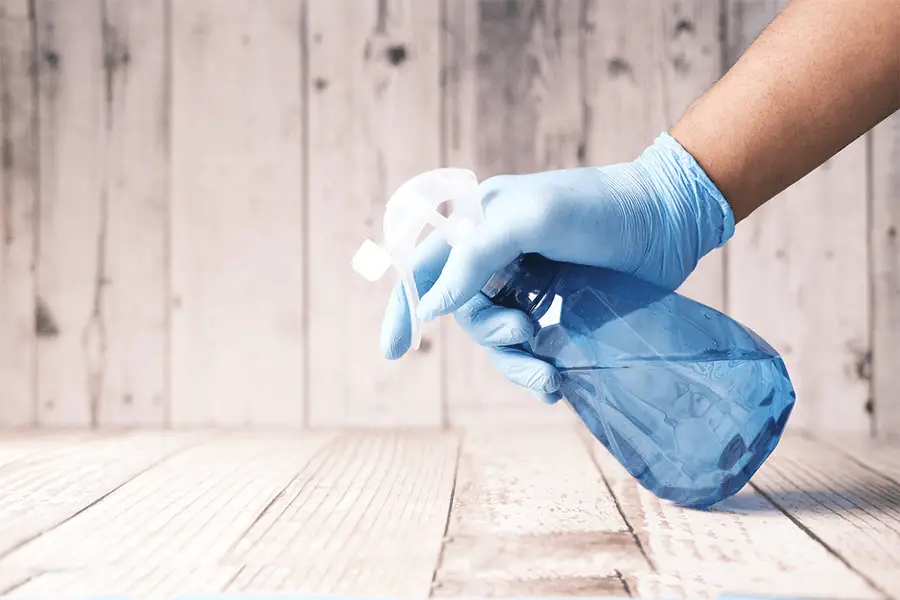
Sprays
Various sprays can be used to kill wasps, however, keep in mind that most of these sprays are very toxic. Therefore, it is necessary to protect pets, children, and allergy sufferers from contact with the repellent.
In addition to killing individual wasps, sprays are also highly effective against wasp nests. Since sprays require close contact with the wasps, it is recommended to use sprays in the dark when most wasps are back at their nest.
Aerosols
Aerosols are another choice that may be utilized in killing wasps. Similar to using sprays, close contact with the wasps is necessary. Therefore, you need to approach this method with extreme caution. It is recommended to approach at night (after dusk) when the wasps are least active and have returned to their nest.
Additionally, you will need to pay attention to the valve. Some products are manufactured with a valve that allows for further distance from the nest. This makes it possible to destroy wasps at a distance of up to 4 meters from the nest, which greatly reduces the chances of getting stung by a wasp.
Spirals
This is rather a wasp repellant than a wasp killer. A spiral is designed to be set on fire atop a metal stand. It extinguishes quickly and then continues to provide a smolder releasing a paralyzing gas. Spirals are widely used to ward off both wasps and other insects, for example, at a picnic.
This product provides a wide radius of cover but it spreads a strong, unpleasant odor because of the wood flour (a special component of the spiral). Additionally, for humans, it can be quite dangerous and toxic to inhale the smolder of the spiral. So, it is not recommended to stay in the same room with the glowing spiral for a long time.
Do these poisons hurt other insects?
All insects, including wasps, have similar biochemical processes and therefore scientists have concentrated their efforts on the creation of special chemicals to ensure wasp misfortune.
Wasps can be very difficult to eliminate. If a poison is concentrated enough to kill them, it likely will hurt other insects in the vicinity. This means your best bet would be locating these creatures and utilizing the best techniques to take them down in a localized area.
How to find wasp nests to administer your poison
To exterminate wasps, you will first need to identify their hideouts. To build nests, wasps extract material from trees that are usually gray or brown in color.
As they build their nest, the dwelling resembles an oblong sphere in shape, which can be suspended (known as an aerial nest) or buried in the ground (that is usually small in size and looks like a tomato).
The most notable kind of wasp is tree wasps. They live in swarms and their nests differ in size, so they are not always easy to find.
The most suitable time to search is the late evening or early morning since at this time the wasps concentrate in their home. They fly away in the morning and fly back in the evening, so it won’t take much time to track them. It is enough to look closely and the hearth will be visible immediately.
Wasp stings can be extremely painful, and may even cause an allergic reaction. Although such attacks are rarely fatal, there are potential risks for any sting to become more critical than anticipated. Therefore, it is crucial to protect yourself, your children, and those with allergies when dealing with a wasp nest.
Are there natural wasp repellants?
If you are looking to rid your home of wasps and are wanting to avoid synthetic poisons or chemicals, you’ll be intrigued to discover several natural repellents that work for wasps.
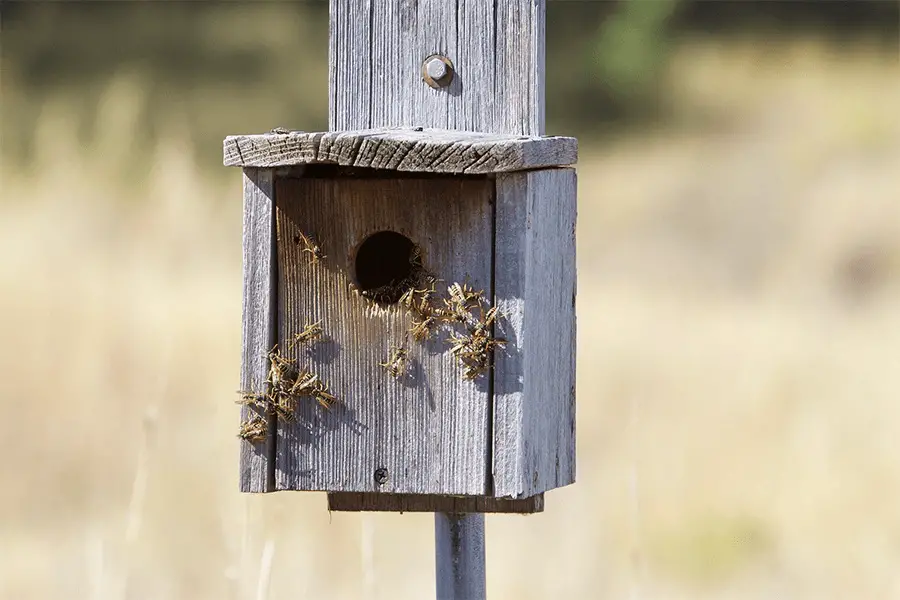
Install fake nests
Installing a fake nest will allow you to move wasps from your home or property. You can place the fake nests further away from the site and trick the wasps into believing that other wasps already live in the nests.
Use ultrasonic device
An ultrasonic device is perfect for scaring wasps away. After activation, the device emits ultrasonic waves. They do not affect humans, however, insects and rodents feel a painful effect on the nervous system causing them to vacate the area.
As a result, these pests quickly leave their usual habitats, discarding all accumulated reserves to save themselves. It is important to note that these devices in no way interfere with the work of other electrical equipment in the house. They are a universal option for fighting insects.
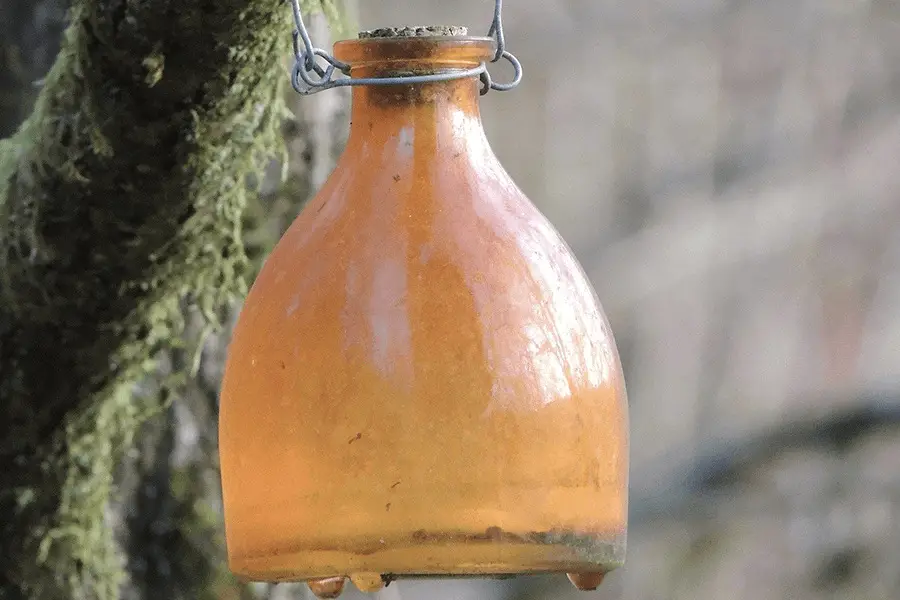
Wasp traps
There are specialized, eco-friendly traps that can be used outdoors to repel wasps. The substances of these traps lure the wasps in and kill them slowly. You can decide to purchase already-made wasp traps or create one yourself.
Usually, apple extract, sugar, and yeast are used for these traps as wasps are attracted to the sweetness. Once trapped through a small hole, the insect is no longer able to escape. The entrance to the device usually has a lattice suspension design making it easy for the trap to adhere to ceilings, stairs, and similar surfaces.
What smell do wasps hate?
Wasps are known to dislike the smell of dry tobacco. You can tie a bundle of dry tobacco straws or leaves and hang it next to the wasp nest, and hopefully, the wasps will scamper. You can also hang the bundles around preventatively to keep wasps away from your house or property.
In addition, wasps do not like the smell of gasoline and peppermint oil, so you can use these in wasp repellant sprays.
Do wasps hate lemon?
This has not yet been proven, although some DIY wasp solutions include lemon as an ingredient. It is true that mosquitoes and some other insects are repelled by lemon, but wasps tend to be tough to ward off. Nevertheless, if you have a wasp infestation, you can try a solution of lemon, clove, and geranium, but there is no guarantee that this would do the job.
Why you should consider natural repellants before poisoning wasps
Many utilize poisons for wasps as a kind of remedy that magically relieves them of annoying insects. This might be true but these poisons have an unpleasant, rather pungent odor, so they must be handled with extreme caution so as not to cause negative health effects.
Moreover, chemical methods are not always able to get rid of wasps. For example, wasps might fly freely around the backyard, while their nest is far away. In this case, a baited trap could be an excellent solution. Also, since most poisons affect many kinds of insects, they might do more ecological harm than good.
In any case, regardless of the approach, you utilize to rid your property of wasps, you must not forget that it is necessary to use personal protective equipment if you are going to deal with wasps. This is because their stings can cause an allergic reaction, which can be fraught with consequences, one of which could be death.
The best option for killing wasps is determined by the situation of the wasp infestation. And for this, you need to know every wasp control method and in what cases they are used, with larger infestations requiring more chemical-based approaches versus a smaller nest that may be able to be dealt with using traps or smells that repel the wasps.
